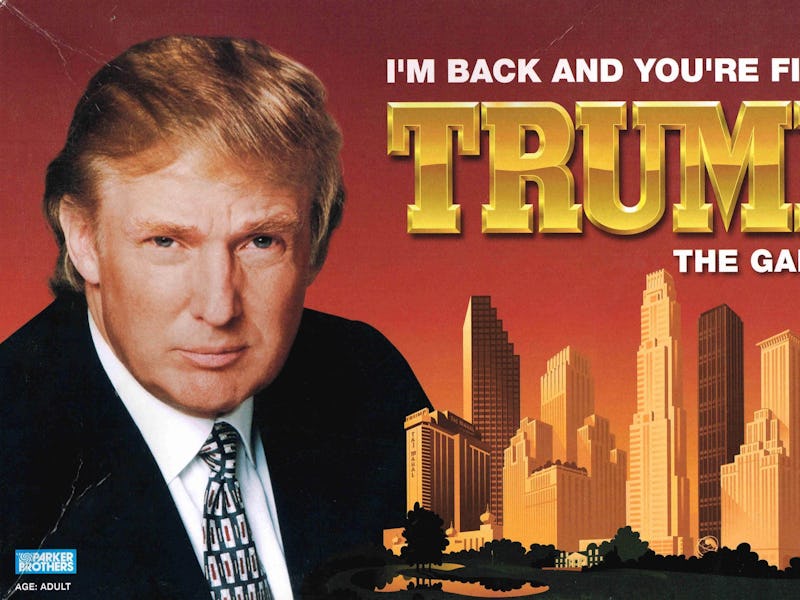What the Infamous Donald Trump Board Game Teaches Us About America
Money makes money and the competition isn't real.

Trump: the Game, a deservedly infamous 1989 board game, goes out of its way to communicate that it is not fucking around. The warning on the box, “AGE: ADULT,” is less about mature content and more about exposure to deep, soul-biting cynicism. “It takes brains to make millions,” adds the cover. “It takes TRUMP to make billions.” This statement, which was intermittently true through the following decades, feels like the ultimate testimony to the mythos of a child who spat out a silver spoon and asked for something classier. Players start the game with $500 million Trump bucks because life ain’t fair.
And it is absolutely a game for adults. Only those who have sipped champagne in a penthouse or bumped lines behind a velvet rope are really going to appreciate this ode to moral, if not financial, negotiation. It is not a good game in that it is very badly designed and totally craven. But it is a somewhat amazing game in that it has its own policy prescriptions.
Like Monopoly, Trump: the Game is built on shaky economic footing. The Monopoly universe is a place where Atlantic City is booming, small business owners take casual glee in destroying each other, and bank fraud is actively encouraged. In Trump: the Game, the cash flows in denominations of $10 million or $50 million or $100 million and features Trump’s quizzically constipated Megan Fox impression. Players use this money to bid on ownership of a Sports Complex, an International Golf Course, or an office building. But only under a few circumstances does money move between players’ hands. Players can land on each other’s property without repercussion, as the bank pays players whenever someone visits their golf courses.
The game takes great pains to appear to pit players against each other, but, in actuality, everyone is playing the bank as the victim.
You spend a turn either rolling custom dice (in which a T has replaced the 6, natch) to go around the board in the hopes of triggering a property bidding war, or you can play a card from your hand. There is a very limited sense of what anything is worth because:
1) You’ve started the game with the GDP of a small island nation and should have just called it a day right then.
2) Halfway through bidding, you can play a “Trump Backs You!” card in which the bank just sort of gives you money, no questions asked or credit checked.
3) When you play a card to tax another players’ property, he or she has to fork over money to you.
Almost by accident, there are a few real lessons here — none of them about the art of the deal. The randomness of having a useful Trump card during a bid reflects the luck’s very real role in wealth accumulation and the game serves as a nice reminder the invisible hand is broken at the wrist. Unlike a mustache-twirling monopolist, players don’t actively try to destabilize their opponents’ empires. There is no mechanism to reign in a runaway player with a grip full of profit cards. There is no regulation here and taxes drip up.
In the late stages of the game, players spend a few turns doing nothing but playing profit cards from their hands and taking money from the bank. Capital makes more capital. And then fate blows on the dice and someone wins the last hotel or resort or whatever. Then the game is over and the oligarchs all win, albeit to varying degrees.
Given the pre-Occupy vibe of the thing, it makes sense that even the newest edition, released in 2004 to coincide with Trump’s NBC Apprentice heyday, retains a hideous patina of late-’80s art deco cheese.
The game is designed to simulate what it’s like to be rich. In a very specific, very Trumpian way, it succeeds.